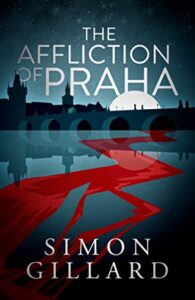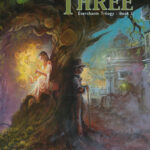I received this book for an honest review. All expressed opinions, cynical or otherwise, are my own.
Atmospheric novels are my bag. Whether it is horror, science fiction, or regular old literary. The Affliction of Praha, a historical mystery by Simon Gillard, has that in spades. But it is not perfect. There are tense issues, POV issues, and a smattering of other problems that are – naturally – exactly what I expect in a debut novel. Still, I am not one to complain too loudly over something I enjoyed.

 Set in the 1920’s of Czechoslovakia, Affliction pulls us into an early Soviet scape. Peter, the eldest of the aristocratic Teralov family has been murdered, and detective Edgar Rollenvart is on the case. Together with Peter’s brother Juraj he mucks around to try to bring the killer to justice.
Set in the 1920’s of Czechoslovakia, Affliction pulls us into an early Soviet scape. Peter, the eldest of the aristocratic Teralov family has been murdered, and detective Edgar Rollenvart is on the case. Together with Peter’s brother Juraj he mucks around to try to bring the killer to justice.
I mentioned this book is atmospheric. Gillard achieves that by a one-two punch of solid descriptions, and effective dialogue. The prose, while not perfect, has a few stand out and artistic lines. The interactions between Edgar and Juraj are also quite good; there is a natural sort of chemistry going on there that is unforced. Edgar is believable as sort of an old-salt detective. And Juraj’s motivations as a grieving brother were satisfactorily established. Beyond the setting, the plot is even paced, and there were enough twists to keep me going.
But – and you could smell the ‘but’ coming in that last sentence – there are a few problems. The first, and it ties into the atmosphere, is the point of view swapping. There were several times when the POV either switched midchapter (and sometimes back and again) without any setup, or the viewpoint was never clearly established. Also, while each character is a unique little snowflake, they are about as deep as the puddle left over from its melting. There is nothing inherently wrong about that, but somehow given the prose and in the fact this is a historical novel, I felt there would be more delving into the culture and backgrounds.
About those descriptions, what we have is fine, and as aforementioned, atmospheric. However, their quality ranges, and can border on overuse. Gillard uses a ton of action dialogue, or descriptions bordering the dialogue tags. Evenly applied this adds flare and helps to establish that all sought after “author voice.” However, this novel tends to stray. Better editing would have alleviated this. One last thought on this subject, and it is a bit of a cliché, but the adage rings true: show, don’t tell. Not a constant problem here, but there were enough happenings that I felt it should be noted.
As the sum of its parts, Affliction at Praha is a nice read. Just don’t look too deeply past the surface.



Leave a Reply